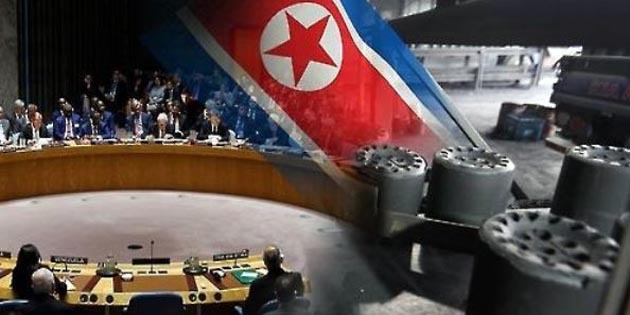UNSC resolution insufficient to change NK behavior, signals tougher action ready: experts
By YonhapPublished : Sept. 12, 2017 - 13:35
The UN Security Council's adoption of fresh sanctions against North Korea is not enough to induce a marked change in its behavior but is still meaningful in that, by targeting oil supplies to the country for the first time, it signals a strong warning that tougher action remains ready to be taken, experts said Tuesday.
On Monday (local time), the UNSC unanimously adopted Resolution 2375 that includes a freeze on its imports of crude oil at the current levels of 4 million barrels a year and a cap on imports of refined petroleum products at 2 million barrels annually.
The Security Council also imposed a complete ban on the North's exports of textile products seen as a major source of foreign currency suspected of being diverted to advance its nuclear and missile programs.
The UNSC adopted the latest resolution following the North's sixth and most powerful nuclear detonation test on Sept. 3. This is the ninth sanctions resolution the council has adopted against the North since 2006, when it carried out its first nuclear test.
"It could be meaningful in that the resolution includes restrictions on oil supplies (to the North), though it still falls short of our expectations," said Cho Bong-hyun, a senior analyst at IBK Economic Research Institute. "More than others, the oil-related measures could have a psychological impact on the North."
On Monday (local time), the UNSC unanimously adopted Resolution 2375 that includes a freeze on its imports of crude oil at the current levels of 4 million barrels a year and a cap on imports of refined petroleum products at 2 million barrels annually.
The Security Council also imposed a complete ban on the North's exports of textile products seen as a major source of foreign currency suspected of being diverted to advance its nuclear and missile programs.
The UNSC adopted the latest resolution following the North's sixth and most powerful nuclear detonation test on Sept. 3. This is the ninth sanctions resolution the council has adopted against the North since 2006, when it carried out its first nuclear test.
"It could be meaningful in that the resolution includes restrictions on oil supplies (to the North), though it still falls short of our expectations," said Cho Bong-hyun, a senior analyst at IBK Economic Research Institute. "More than others, the oil-related measures could have a psychological impact on the North."

This is the first time that the UNSC resolution has included restrictions on oil supplies to the North. Experts analyzed that it would lead to around a 30 percent reduction in total supplies of oil-related products to the North.
The move is still not as tough as the US wanted. In its earlier draft, the U.S wanted to put a total ban on oil supplies to the North as it could have a crippling impact on its economy and be strong enough to prod Pyongyang to negotiate for its denuclearization.
China and Russia, two of the five veto-wielding council members, reportedly balked at any move that could destabilize the impoverished country. China supplies most of the oil to its ally the North.
"It seems that the US and China, in particular, have reached a compromise in which the former wants to take tougher action against the North and the latter wants to avoid steps that could destabilize its ally," said Kim Keun-sik, a professor at Kyungnam University.
"China wants to make the North feel the pain but doesn't want to be so tough that the North collapses. That will not likely change much in the future," he added.
Experts said that China will likely implement what was agreed upon in the latest deal with the US "for the time being," but it remains to be seen whether it will keep pressing the North in the long term. It is not clear whether the restricted oil supplies to the North would have its intended impact.
Still, they noted that the measure could open the way for a complete oil embargo.
"The resolution will cut the North's oil imports by around 29 percent, which will eventually put a brake on the North's consistent economic growth and raise the chances for its economic slowdown going forward," said Chung Seong-chang, a senior research fellow at the South Korean think tank Sejong Institute.
"Though such an action has obvious limitations of its own to make the North change its policy, it is very meaningful given that the UNSC action has opened the way for a complete suspension of oil supplies to the North down the road," he added.
A North Korea expert who asked not to be named agreed with the view, saying that the US seems to have left its last cards to play in case the North continues with additional provocations.
"The North is unlikely to come out to negotiate until it announces the completion of its nuclear capabilities," he said.
"Until that time, the US will continue to impose additional sanctions and the North will continue to seek provocations.
Eventually, we will have to get to the endgame. Before that part comes, the US seems to have cards left that it can use," he noted.
In an apparent hint that it will ramp up its provocative acts, the North warned on Monday that the US will suffer the "greatest pain" if it pushes ahead with new tougher UN sanctions over its sixth nuclear test, threatening that it will make Washington pay a "due price." (Yonhap)






![[Weekender] How DDP emerged as an icon of Seoul](http://res.heraldm.com/phpwas/restmb_idxmake.php?idx=644&simg=/content/image/2024/04/25/20240425050915_0.jpg&u=)



![[KH Explains] No more 'Michael' at Kakao Games](http://res.heraldm.com/phpwas/restmb_idxmake.php?idx=644&simg=/content/image/2024/04/28/20240428050183_0.jpg&u=20240428180321)
![[Music in drama] An ode to childhood trauma](http://res.heraldm.com/phpwas/restmb_idxmake.php?idx=644&simg=/content/image/2024/04/25/20240425050929_0.jpg&u=)






![[Herald Interview] Mistakes turn into blessings in street performance, director says](http://res.heraldm.com/phpwas/restmb_idxmake.php?idx=652&simg=/content/image/2024/04/28/20240428050150_0.jpg&u=20240428174656)
